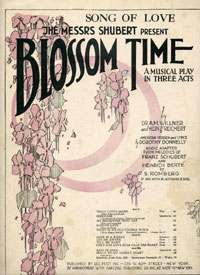 |
 |
| A donation will help the work of American Classics |
|
American Classics - Blossom Time
Please click here to listen to selections from the show. "Like Aladdin and his wonderful tarnished bronze lamp of 'The Arabian Nights', American Classics polished up 'Blossom Time.'" - Kay Bourne, Edge Publications,, 4/17/09 All but forgotten now, Blossom Time was one of the most popular musical shows in America of the twentieth century. It originally opened at the Winter Garden on September 29, 1921 and was never out of production in one way or another through its last revival in 1943. In 1921 and 1923 it played simultaneously at two theatres in New York! Road companies, usually six, but once as many as nine, kept the show alive throughout the country, even if it was not playing in New York. Musically drawn in part on melodies of Franz Schubert (1797-1828), Blossom Times allure seems to have been his music combined with what the critics, as late as 1943, called undiluted escapism of a deeply nostalgic picturesque sort. Another critic that year called it an old-fashioned bouquet, quaint and lacy. Blossom Time had its origins as a show in Vienna as Das Dreimäderlhaus (The House of Three Girls) in 1916. The book by A.M. Willner (1859-1929) and Heinz Reichert (1877-1940) was a fictionalized account of the life of Franz Schubert. The original score had only one tune of Schubert's in it, "Ungeduld" from Die Schone Mullerin; otherwise it was by the Hungarian composer Heinrich Berté (1857-1924), now a forgotten figure. The producers, however, wanted more Schubert, so Berté rewrote the score, creating a pastiche of Schubert and his own music. After success in Vienna the show went to Berlin, Paris as Chanson d'Amour (Song of Love), and London as Lilac Time. In an interesting twist of fate, it was the Shubert (minus the c) Brothers, Lee (1873-1953) and J.J. (1879-1963) (see photo), who acquired the American rights to the show, turning it over to Sigmund Romberg (1887-1951) (see photo) to create new arrangements, primarily from Schubert but also utilizing some Berté. Dorothy Donnelly (1880-1928) provided the English lyrics, which are serviceable and provide an operetta flavor. – Benjamin Sears Hear Selections from Blossom Time
|
© American Classics • 70 Allston St., Boston, MA 02134, 617-254-1125 • AC@benandbrad.com |
 American Classics presented selections from Blossom Time in a critically acclaimed concert performance in 2009.
American Classics presented selections from Blossom Time in a critically acclaimed concert performance in 2009.